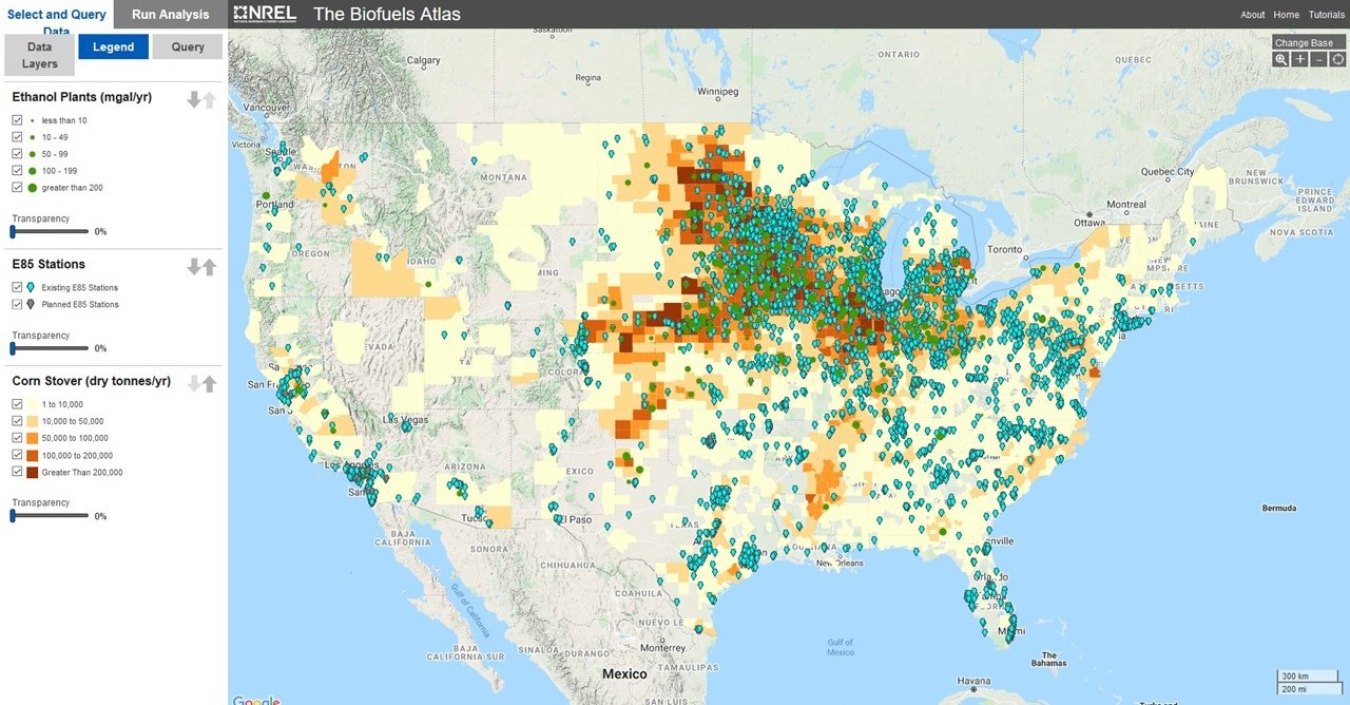The Bioenergy Technologies Office (BETO) supports new analytical tools and methods, and guides the selection of assumptions and methodologies to be used for all analyses to ensure consistency, transparency, and comparability of results.
These tools, methods, and assessments help BETO focus its technology development priorities for the near, mid, and long term by identifying opportunities to achieve the greatest potential benefits. These resources support creating a thriving bioenergy industry that is economically self-sustaining, protects natural resources, and enhances environmental and social benefits.
Bioenergy Models: The National Renewable Energy Laboratory provides researchers interested in bioenergy and bioeconomy analysis with an inventory of bioenergy and bioproduct models and tools, key information about each model, and an interactive display of relationships among models.
Bioenergy Knowledge Discovery Framework (KDF): The Bioenergy KDF is a web-based data repository, visualization geospatial analysis tool, and library that allows researchers, policymakers, and investors to engage with and explore the latest bioenergy research.
The Alternative Fuels Data Center (AFDC): The AFDC provides data, documents, online tools, and other resources to enable implementation of alternative fuel and advanced vehicle technologies at the local and regional levels.
Biofuels Atlas: The Biofuels Atlas is a first-pass visualization tool—created using the Google Maps application program interface—which allows users to explore the potential of biomass-to-biofuels conversions at various locations and scales. It includes the ability to download state-level data and analyze data for specific user-selected geographic areas.
The Greenhouse Gases, Regulated Emissions, and Energy Use in Transportation (GREET) Model: GREET is a life cycle analysis tool that simulates the energy use and emissions output of various vehicle and fuel combinations.
PUBLICATIONS
Design Reports
Design cases outline a target case and provide preliminary identification of data gaps and research and development needs. BETO uses design cases as a basis for setting technical targets and cost-of-production goals.
- Design Case: Biochemical Conversion to Hydrocarbon Fuels and Coproducts (2018)
- Design Case: Hydrothermal Liquefaction of Wet Waste to Fuels (2017)
- Design Case: Algal Biomass Production in Open Pond Systems (2016)
- Design Case: In Situ and Ex Situ Catalytic Fast Pyrolysis of Lignocellulosic Biomass to Hydrocarbon fuels (2015)
- Design Case: Combined Algae Processing (2014)
- Design Case: Whole Algae Hydrothermal Liquefaction (2014)
- Design Case: Feedstock Logistics (2014).
State of Technology Assessments (SOTs)
SOTs serve as periodic (usually annual) status assessments of technology development for a biomass-to-biofuels or -bioproducts pathway. A SOT assesses progress within and across relevant technology areas based on actual experimental results relative to technical targets and cost goals from design cases and includes technical, economic, and environmental criteria as available.
- 2019 R&D State of Technology
- Ex Situ Catalytic Fast Pyrolysis of Lignocellulosic Biomass to Hydrocarbon Fuels: 2019 State of Technology and Future Research
- High-Octane Gasoline from Lignocellulosic Biomass via Syngas and Methanol/Dimethyl Ether Intermediates: 2019 State of Technology
- Wet Waste Hydrothermal Liquefaction and Biocrude Upgrading to Hydrocarbon Fuels: 2019 State of Technology
- Biochemical Conversion of Lignocellulosic Biomass to Hydrocarbon Fuels and Products: 2019 State of Technology and Future Research
- Woody Feedstocks 2019 State of Technology Report
- Algal Biomass Production via Open Pond Algae Farm Cultivation: 2019 State of Technology and Future Research
- Algae/Wood Blends Hydrothermal Liquefaction and Upgrading: 2019 State of Technology
- Algal Biomass Conversion to Fuels via Combined Algae Processing (CAP): 2019 State of Technology and Future Research.
Resource Assessments and Industry Status Reports
Resource assessments identify the geographic location, price, and environmental impact of accessing existing and potential feedstock resources. BETO analysis activities utilize these data to understand price effects of competition from various biomass-utilization technologies (e.g., biofuel versus biopower), as well as to assess cross-technology impacts of feedstock cost, quantity, and quality.
- Waste-to-Energy Resource Assessment (2018)
- 2016 Billion-Ton Report
- 2016 Bioenergy Industry Status Report
- 2015 Bioenergy Market Report
- 2013 Bioenergy Market Report.
Supply Chain Sustainability Assessments
To support the evaluation of BETO research and development priorities, environmental modeling is used to conduct full life cycle assessments, or supply chain sustainability analyses (SCSA), on representative biofuel technology pathways.
SCSAs are used to monitor progress against BETO goals of developing pathways with increased net energy efficiency and greenhouse gas (GHG) emission reductions as well as to understand associated pathway water consumption.
Pathway-specific SCSA results do not address all aspects of environmental sustainability, but are critical to understanding the key drivers of energy use, GHG emissions, and water consumption, and how these attributes change in relation to process design changes and cost improvements.
- SCSA: Renewable Hydrocarbon Fuels via Indirect Liquefaction, Ex Situ Catalytic Fast Pyrolysis, Hydrothermal Liquefaction, Combined Algal Processing, and Biochemical Conversion: Update of the 2019 State-of-Technology Cases
- SCSA: Syngas Upgrading to High Octane Gasoline, Ex Situ Catalytic Fast Pyrolysis, Hydrothermal Liquefaction of Wet Waste, Combined Algal Processing, and Biochemical Conversion (2018).


